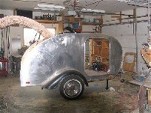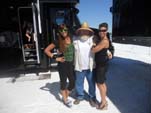Hoping for an OK expecting a NO
10 posts
• Page 1 of 1
Hoping for an OK expecting a NO
I prewired all my walls and I'm set up to have a 3 gang switch at the head of the bed. Fan, 2 reading lights, and the cabin dome. I ran #12 wire in and out for fan and #14 in and out for each light. I went and got the 3 gang switch I planned on using ( 110v 3 rocker switches in a single box. When I got it home it only has 1 hot going in and 3 switched going out. If I used the #12 for the hot in and #12 to fan and #14s to the lights and put them all on a 20amp fuse will that be safe? Will the fuse not brake soon enough if I'm just using a light or is the single #12 not large enough to run them all at once? If I fished in all #12 would that help or do I just need to forget what I thought would be the perfect switch? Sorry that got so long, I guess what I'm asking is, is there is a good way to put two lights and the vent fan on 1 circuit? Bob
-

Southern Oregon Bob - Teardrop Advisor
- Posts: 59
- Images: 2
- Joined: Tue Mar 01, 2005 11:08 pm
- Location: Southern Oregon
Re: Hoping for an OK expecting a NO
Southern Oregon Bob wrote:I prewired all my walls and I'm set up to have a 3 gang switch at the head of the bed. Fan, 2 reading lights, and the cabin dome. I ran #12 wire in and out for fan and #14 in and out for each light. I went and got the 3 gang switch I planned on using ( 110v 3 rocker switches in a single box. When I got it home it only has 1 hot going in and 3 switched going out. If I used the #12 for the hot in and #12 to fan and #14s to the lights and put them all on a 20amp fuse will that be safe? Will the fuse not brake soon enough if I'm just using a light or is the single #12 not large enough to run them all at once? If I fished in all #12 would that help or do I just need to forget what I thought would be the perfect switch? Sorry that got so long, I guess what I'm asking is, is there is a good way to put two lights and the vent fan on 1 circuit? Bob
Most household extension cords are 14 or 16 gauge wire, I'm sure people have loaded those with more than a fan and two lights. If you're running 12 gauge wire, I sure can't see how you'd have a problem. I've got a 25' 12 gauge extension cord that I run my table saw on.
I just reread your post, Are your lights & fan 12 volt or 110? I assumed they were 110 because you mentioned using the 110 volt switch. If you are running 12 volt, I would advise against using the 110 volt switch, it's not designed to handle the amperage of the 12 volt system.
"Follow me, I'm right behind you"




-

Kevin A - The other guy
- Posts: 3222
- Images: 289
- Joined: Mon Jan 17, 2005 1:16 am
- Location: California, Eureka





